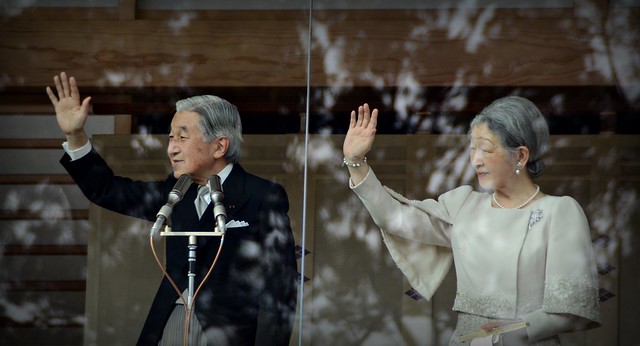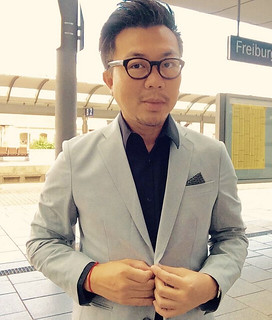Japan’s Emperor Akihito and Empress Michiko will visit Thailand from 5-6 March 2017. This will be their first visit in ten years, mainly to strengthen ties between the two countries and for Their Majesties to pay the last respect to the late King Bhumibol Adulyadej.

Japan’s Emperor Akihito and Empress Michiko (By courtesy of Richard Hopkins)
On the occasion of their visit to Bangkok, it is timely to look back to the Thai-Japanese relations amid Thailand’s deepening political crisis and the shifting geopolitical landscape of Southeast Asia.
Since the coup of 2014, Japan has represented itself as a source of legitimacy for the Thai military regime. Earlier, Japan voiced its concern about the grave situation in Thailand. Foreign Minister Fumio Kishida released a statement on 22 May 2014, stressing that it was regrettable that the coup took place and urged that democracy should be restored in the country quickly. Japan, as a major trading partner of Thailand, had been careful in its policy towards the country. Although Japan has not imposed official sanctions against the junta, it was reported that a study tour of a group of Thai police to Japan was cancelled almost at the last minute, purportedly because of the coup.
But the Japanese position has been shifting. Prime Minister Prayuth Chan-ocha’s trip to Japan from 8-10 February 2015 was widely publicized in Thailand as a success in earning a recognition from one of the most powerful economies in the world. While in Tokyo, Prayuth discussed a deal with the Japanese government on a high-speed train project that involved the building of rail tracks connecting Bangkok with Myanmar and Cambodia— also known as the East-West Corridor rail line—as well as state-of-the art trains similar to Japan’s own famous shinkansen. Prayuth also took the shinkansen from Tokyo and Osaka to experience a ride that in the future would be in service in Thailand. The high-speed train project was the result of recent multiple meetings between Prayuth and leaders in the Japanese government.
Earlier on 27 January 2015, Hiroto Izumi, special economic adviser to Prime Minister Shinzo Abe, held a discussion with Prayuth in Bangkok on the high-speed train agreement. Prior to this meeting, Prayuth also met with Abe in October 2014 at the Asia-Europe Meeting in Milan and again, in November 2014, at the ASEAN summit in Myanmar’s Nay Pyi Taw. Japan has provided breathing space for the Thai generals amid Western sanctions against their military regime. Although the political drama in Thailand is far from over, Prayuth’s trip to Japan became a convenient break from the heat of Thai politics at home.
Despite concerns over the Thai political situation, bilateral ties have been strong. Japan has been willing to reciprocate to the changing political climate in Thailand while maintaining its position in the country. This occurred at the same time as other actors, particularly China, have begun to seriously exert their influence in Thailand too.
Japan has remained the only country in the Group of Eight Industrial Nations to roll out a red carpet welcoming the Thai junta in the aftermath of the coup. The need to guard against its interests and to compete with China explicates Japan’s active policy vis-à-vis Thailand. Up to the year 2015, Japan was Thailand’s second largest importer and third largest exporter. As Thailand has been drawn more into the Chinese orbit, Japan has proposed a myriad of investment projects to win over the Thai junta. To counter the Chinese rail project in Thailand, Japan has offered the Thai government Y170 billion in loans for a similar railway scheme.
In February 2017, Japan and Thailand also signed a memorandum of understanding (MOU) to expand collaboration for the development of small and medium-size enterprises (SMEs) by mutually encouraging business-matching deals between firms of the two countries. The signing of the MOU went on despite the fact that the political situation in Thailand has not been improved and that the junta again postponed the date of elections citing the failure of the initial reconciliation process among opposing political factions.
In the realm of political cooperation, the political-military talks between Thailand and Japan, established since 1998, has been strengthened especially as inter-state conflicts have sporadically erupted to disturb the regional security, including the conflict in the South China Sea. Japan is monitoring closely the political-security ties between Thailand and China, which has also been upgraded rapidly over the years. Since the early 1980s, Thailand has purchased armaments and military-related equipment under this partnership at “friendship prices”. Sino-Thai military links are among some of the most developed in the region—second only to Myanmar, China’s once quasi ally. In 2010, China proposed joint defence exercises and military exchanges to the Thai leaders, hoping to catch up with the US’s military relations with Thailand.
In June 2016, Japan’s then-Defense Minister Gen Nakatani visited Thailand and initiated several substantive steps that constituted significant advances for bilateral ties, mainly in terms of exchanges, exercises, and training. These included establishing staff talks between the Royal Thai Army (RTA) and the Japan Ground Self-Defense Force; dispatching observers from the RTA to Japan’s “Nankai Rescue” exercise for the first time; and conducting a multilateral engagement under the ASEAN Defense Ministers Meeting Plus (ADMM-Plus).
Prashanth Parameswaran reported that bilateral talks also touched upon other more ambitious aspects of mil-to-mil relations like defense industry cooperation and potential transfers of defense equipment. Thailand has been said to be interested in specific equipment like the Japan Maritime Self Defense Force’s P-1 patrol aircraft and US-2 large amphibious rescue aircraft.
Following the passing of King Bhumibol Adulyadej in October 2016 and the enthronement of the new king, Vajiralongkorn in December the same year, there is still no sign of the military’s willingness to step down. The royal transition has left a power vacuum in the Thai political domain. The military is not certain whether the new king will be well received by the Thai public and is therefore searching every possible way to entrench itself in politics. But this means that democracy may not be restored soon. The less democratic atmosphere in Thailand has opened a space for countries like Japan to sharpen its strategy in reaping the benefits from the situation.
There are growing calls for Japan to sustain its already robust economic tempo in Southeast Asia, which is falling under China’s domination. In January 2017, Prime Minister Abe paid a visit to the Philippines, Indonesia, Vietnam and Australia. Although Thailand was not included in his trip, the objective of the visit was clear—to play a proactive regional role, to counteract rising Chinese influence and even to lessen the fear of declining US influence. In the end, Japan has chosen to follow in the footsteps of China in endorsing the military regime in Thailand, which may not help improve the political crisis in Thailand in the long run.
 Pavin Chachavalpongpun is associate professor at Kyoto University’s Centre for Southeast Asian Studies.
Pavin Chachavalpongpun is associate professor at Kyoto University’s Centre for Southeast Asian Studies.

